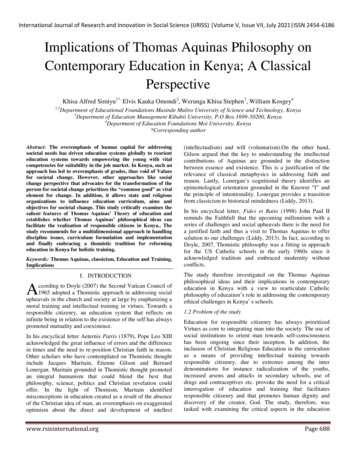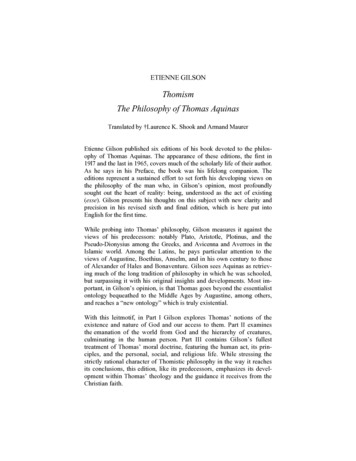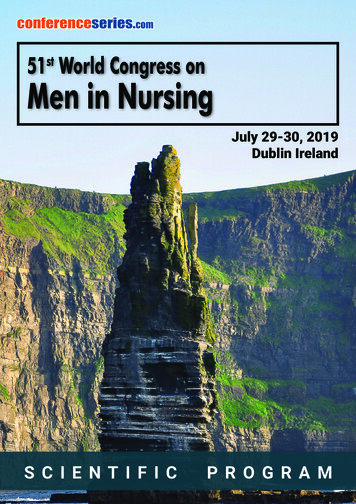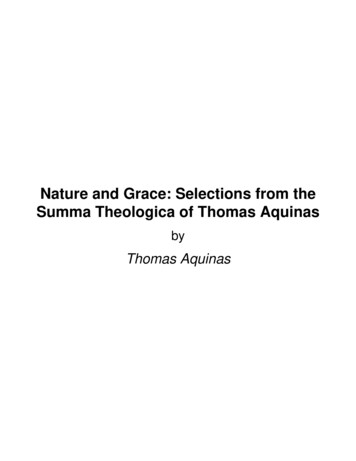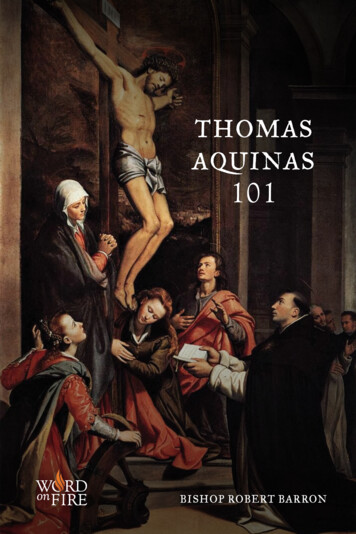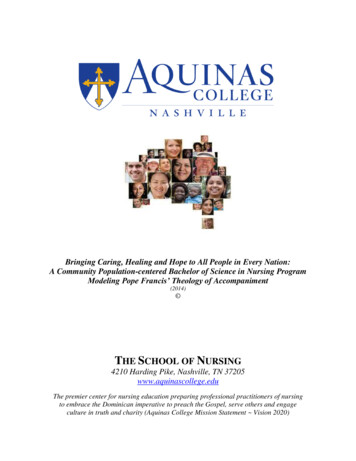
Transcription
Bringing Caring, Healing and Hope to All People in Every Nation:A Community Population-centered Bachelor of Science in Nursing ProgramModeling Pope Francis’ Theology of Accompaniment(2014) THE SCHOOL OF NURSING4210 Harding Pike, Nashville, TN 37205www.aquinascollege.eduThe premier center for nursing education preparing professional practitioners of nursingto embrace the Dominican imperative to preach the Gospel, serve others and engageculture in truth and charity (Aquinas College Mission Statement Vision 2020)
2The Bachelor of Science in Nursing Program has been granted initial approval by the TennesseeBoard of Nursing, Division of Health Licensure and Regulation, effective December 4, 2014This program is the property of the School of Nursing of Aquinas College, 4210 Harding Pike,Nashville, TN 3720. No part of this program may be reproduced, stored in a retrieval system,transmitted in any form or by any means (mechanical, electronic, photocopying, recording orotherwise) without written permission of the Dean, School of Nursing, Aquinas College,Nashville, TN.
3IntroductionOn many occasions our Holy Father, Pope Francis, has challenged each of us to embracethe New Evangelization and take the Face of Jesus to the peripheries of human existenceespecially among the lost, the least and the last among us, all masterpieces of God’s design. Withhis call to embrace the theology of accompaniment in health care,1-2-3 we must go well beyondjust caring for the well and the sick by implementing strategies to prevent illness and disabilitythat focus on health promotion for individuals, families and communities. Empowered with theMission of Aquinas College and the Vision and Philosophy of the School of Nursing, we arecalled to bring caring, healing and hope to our brothers and sisters who are forced to live on theperipheries of life and in morally flawed systems of oppression and suffering that dehumanizethem. As clinicians and healers, we are called to accompany our suffering brothers and sisters intheir journeys in seeking the healing Face of Jesus; to help them embrace new dreams; and tohelp them move to new and different places into the very center of the human family wheredignity, freedom and human flourishing will be protected and affirmed, where the unwanted, theabandoned and the unloved will be touched through the care and compassion of others, andwhere caring, healing and hope are enjoyed by all persons in every nation.We as faculty, staff, students and alumni of the Aquinas College School of Nursing arecommitted to responding to the health care needs of all people of the world wherever they arefound, to care for others with the resources from our very substance not from our abundance, andto accompany them in their journeys toward renewal, freedom and human flourishing. Throughour community population-centered nursing program we are actively and intentionallyresponding to the call of the Church to bring its healing ministry to all those in need of healthand nursing care regardless of age, color, creed, gender, ethnicity, reason for their illness,lifestyle, the ability to pay or wherever they call home. We are committed to working with othersto change and transform systems that continue to victimize and exploit our brothers and sistersthrough unethical practices and legislation, oppressive conditions, human trafficking, unjustcircumstances, institutions of discrimination and indifference that continue to crucify humanityin its flesh and in its unity.4Brief History of Aquinas CollegeIt was nearly six decades ago that the dream of a Catholic college would become a realityin the city of Nashville. So with the same daring ingenuity that caused the founding of theDominican Sisters of St. Cecilia’s, in the atrium of the Civil War, these prophetic and undauntedwomen set forth to found Aquinas College in 1961 – just a mere one hundred years after theycrossed the Cumberland in a long journey from Kentucky.The roots of Aquinas College, however, began in 1216 when St. Dominic committed hisnew Order of Preachers to a new evangelization that was served by friars who were called topreach God’s mercy and compassion for every person who has ever been born. He sent hisenthusiastic friars to study in the great intellectual centers of Europe not to become academics,theologians or philosophers; rather he identified the need for his friars to be informed in thesacred sciences for the prophetic role of getting the message of salvation correct for thePreaching of the Word that was to follow. We need not hesitate in claiming that Aquinas Collegetraces its ecclesial charter to its roots in 1216; we are actually some seven-hundred and ninetynine years old!
4Through this journey, a journey that has touched thousands of lives these fifty years, thereach of the influence of Aquinas College in the world is without measure. These travels havebeen difficult for some, challenging for others and celebratory for the many. We know of theexperienced narratives of our graduates, former faculty and staff about how this journey has beentransformative through grace and mercy. The profound experiences of conversion through thelived experiences of the Aquinas Mission in the lives of many remain deep in personal historiesthat, at times, come forth at unexpected encounters, places and events. The rich endowment ofthe Aquinas Mission in the lives of the many of the past and those yet to join us will continue tobe told long beyond our time.This journey of transformation, encapsulated in the lived experience of the Mission andCore Principles of Aquinas College, is centered in the dignity and freedom of the human personand serves as the centrifugal force that binds all of our duties, responsibilities, activities andindeed our persons together in what we describe as the holy environment of Aquinas College.Keeping the optic on the human person, affirming the person’s unrepeatable andinviolable uniqueness among colleagues, students, families, alumni, and our clinical practicepartners - has not always been easy, comfortable or even successful. Yet the call for theseencounters of caring with dignity and mercy are deeply embedded in the heart and soul of ourmission in this place and among those we are privileged to serve.AQUINAS COLLEGE MISSION AND CORE PRINCIPLESThe Mission of Aquinas College is a Catholic community of learning in the DominicanTradition with Christ at its center. The College directs all its efforts to the intellectual, moral,spiritual, and professional formation of the human person in wisdom. Students are formedindividually and in a Christian community so that the harmonious integration between faith andreason can permeate every dimension of their lives. Immersed in exploring the relationshipbetween human civilization and the message of salvation, the College community embraces theDominican imperative to preach the Gospel, serve others, and engage culture in truth and charity.CORE PRINCIPLESDerived from the Catholic and Dominican moral and intellectual tradition, our coreprinciples are: The dignity, freedom, and flourishing of every human person as made in God’s imageThe complementarity of faith and reason as the basis for academic communityThe prudent stewardship of God’s individual and communal giftsNursing Education at Aquinas CollegeResponding to the needs of the time, Aquinas College implemented the Associate DegreeNursing Program in 1983 following the closure of St. Thomas Hospital School of Nursing thatwas immediately adjacent to the College’s Main Campus. In 1996, again in response to the needsof the nursing workforce, the College implemented the RN-BSN Program for registered nurses
5with Diplomas and Associate Degrees in Nursing who wished to earn the Baccalaureate Degreein Nursing.Opened in August 2012, the Master of Science in Nursing Education (MSN) Program andPost-Master’s Certificate Program in Nursing Education (PMC) offers a seminal opportunity tofurther the Mission of Aquinas College into the arena of graduate education in nursing.Students are prepared to take the Mission and Core Values of the College into new,challenging and unchartered cultures, both at home and abroad, and to help both inform andshape the new and emerging heath care paradigms and nursing practice through nursingeducation.PHILOSOPHY OF THE SCHOOL OF NURSINGThe School of Nursing at Aquinas College, using an academic progression curriculummodel, offers two degree programs, one leading to the Bachelor of Science in Nursing (BSN)and a second program leading to the Master of Science in Nursing (MSN) and a Post-Master’sCertificate Program in nursing education that support and implement the mission and coreprinciples of Aquinas College founded on Christian principles of truth and charity in theCatholic- Dominican moral tradition.The Faculty of the School of Nursing commits itself to:1. provide a culture of learning in an educational community where Christian caring, criticalthinking, moral decision-making, quality education, holistic nursing practice, andstandards of professional nursing are modeled by faculty and acquired by students; and to2. prepare women and men to practice nursing in a competent, professional, ethical, andeffective manner within a culturally diverse society in a variety of settings (AquinasCollege Catalog; Aquinas College Student Handbook).In exercising their responsibility for creating a culture of learning leading to professionalnursing practice, the Faculty sets forth the following beliefs:1. Dignity and Flourishing of the Human Person: We believe:a. in the unique dignity and unrepeatability of every person who is created by God inHis own image and is worthy of dignity and respect from the moment ofconception to natural death;b. every person, as a citizen and member of a family, community and society hasrights, privileges, and responsibilities regardless of age, sex, race, creed, ethnicity,socio-economic status, or station in life, and has been endowed with free will inthe exercise of conscience and the potential for purposeful, moral and deliberatebehavior.c. every person interacts holistically with, and responds physically, psychosocially,spiritually, developmentally, and culturally to others and to the environment.d. the formation of the moral person occurs in a community where dialogue, truth,charity, compassion and prayer are valued.
62. Health and Health Care: We believe:a. health is viewed as coexisting on a continuum that ranges from an optimal level ofwellness and human flourishing to death.b. wellness is the optimum level of functioning and well-being that is attainablethrough an individual’s relationship with God, self, others, and the environment.c. providing quality and safe health and nursing care and advocating for equal accessto health services, is a means of participating in the healing ministry of theChurch with access to quality and safe care,d. health care is a right of each individual from the moment of conception untilnatural death and can be provided in a variety of settings.3. The Art, Science and the Practice of Nursing: We believe:a. nursing is an art and a science of human caring, grounded in the moral tradition ofthe Catholic health care ministry, and the integration of the humanities, thenatural, behavioral, and social sciences and religious studies and applied in a codeof ethics and standards of professional behaviors.b. the changing and expanding role of nursing, as an inter-disciplinary partner in thehealthcare delivery system, uses a holistic framework of nursing care forindividuals, families, and communities that is necessary to protect human dignityand freedom, and to promote, maintain, or to restore the person to an optimumlevel of wellness and human flourishing as a member of a family, a communityand society.4. Nursing Education: We believe:a. nursing education is based on the integration and application of knowledge andcompetencies from the liberal arts, sciences and religious studies and professionalnursing with a foundation in Christian principles.b. nursing education within the Christian learning community must apply moralprinciples and the exercise of an informed conscience in meeting the health careneeds of a culturally-diverse society in an evolving and reformed healthcaresystem.c. nursing education must consider the diverse social, economic, cultural,educational, and religious beliefs and experiences within both the educational andthe professional practice settings.d. developing and applying nursing practice competencies in the art and science ofnursing can best be accomplished in an institution of higher learning, wherestudents acquire a foundation in liberal arts, sciences and religious studies as thefoundation for nursing in collaboration with faculty and students of otherdisciplines.e. the culture of learning fosters personal and professional growth necessary for theintegration and synthesis of new knowledge that occurs when liberal arts,sciences, theology, philosophy and professional nursing are integrated and appliedin caring for persons in a variety of clinical settings.f. nurse educators facilitate the acquisition and application of new knowledge,competencies and abilities through teaching-learning strategies that promote the
7successful achievement of core practice competencies in order to achieve programoutcomes.g. learning is a cumulative, lifelong, individual process achieved within a dynamic,interactive, and collaborative setting where mutual respect and holding multipleperspectives without judgment are fostered.h. faculty and students share the responsibility for the success or failure of thelearning process and its educational outcomes. The teaching-learning process isplanned, actively involves the learner, and progresses from simple to complex thatresults in the attainment of specific outcomes.i. nurse educators, as facilitators of learning, enrich the Christian learningcommunity and provide information, guidance, and reinforcement to stimulatelearning, the integration of truth and charity and the application of moralprinciples in the practice of nursing.Rationale for the New Community Population-centered BSN ProgramThe Bachelor of Science in Nursing Program (BSN) offers a seminal opportunity tofurther the Mission of Aquinas College into the arena of community population centered nursing.While baccalaureate nursing education is specifically called for in the mission of AquinasCollege Vision 2020-Truth and Charity the long term value of this creative initiative hasimportance far beyond simple compliance with a written plan of action or adding anotheracademic program.Undergraduate studies in nursing in the Catholic and Dominican Tradition at AquinasCollege represent the beginning of another new and exciting frontier in learning in Dominicanhigher education as students are prepared to take the Mission and Core Principles of the Collegeinto new, challenging and unchartered cultures, both at home and abroad, and to help bothinform and shape the new and emerging heath care paradigms and nursing practice throughnursing education. No other institution in higher education in the Catholic and DominicanTradition has yet to approach undergraduate education in nursing in this unique manner.The BSN Program stands apart from other Catholic programs in nursing education aswell, as evidenced in its philosophical and theological foundations but, more importantly, by itsfocus on preparing confident and competent clinicians whose primary outcome is centered inaffirming and protecting and promoting the dignity, freedom and flourishing of the one who issick and the one who has promised to care and to heal all those in our families, communities andnations. The mission of evangelization through healing of the lost, the last, and the least amongus is what we must be about in nursing education at Aquinas College. This is the College’sproper role in the universal Church.Conceptual FrameworkThe origins of community-population-centered nursing began with the dawn ofChristianity and can be traced to the first century when women and men, committed to humandignity, freedom and human flourishing, dared to venture into the streets, barrios and pest housesin the community to provide compassionate care for the poor, the sick, the homeless, the
8orphaned, unwanted and unloved, those suffering with stigmatized illnesses, contagious diseases,and the dying. These noble caregivers were the living witnesses of the Church’s healing ministryof charity and mercy. These early beginnings of human caring established the foundations for thedevelopment of nursing that evolved over the last two thousand years and are now envisionedwithin the conceptual framework for the Bachelor of Science in Nursing Program at AquinasCollege that is designed to:5-61. protect and defend human dignity, freedom of conscience, and promote humanflourishing for all persons from conception to natural death;2. encounter and care for the sick and families in their homes, in community health centers,nurse managed clinics, schools, shelters, hospitals, on the streets or wherever they callhome;3. nourish the hungry, spiritually, physically, emotionally and psychologically;4. advocate for the poor, the lost, the last and the least and especially those victimized byoppression, human trafficking, unjust circumstances, institutions of discrimination andindifference that crucify humanity in its flesh and in its unity;75. visit the imprisoned, the alienated, the addicted, the abandoned, the unloved and thosewho have lost hope;6. advocate for safe housing for the homeless and the unemployed;7. promote healthy living through healthy diets, exercise, rest, clean water, safeenvironments, and a self-commitment to maintaining health;8. collaborate with inter-professional colleagues and citizens of the world community indeveloping and implementing a culture of care and humility among clinicians to effectpositive change in promoting health and healing, the management of chronic illnesses,and the elimination of health inequities.89. improve and promote healthy living of individuals, families, communities andpopulations including immigrants and indigenous peoples through culturally-competenteducational opportunities and the design, implementation and the continuing assessmentof inclusive systems of care.910. develop and re-shape health policy and care systems in collaboration with others thatpromote effective, affordable, ethical and accessible health care regardless of the natureof the illness or the ability to pay;Now nearly two thousand years later, with daring ingenuity, in a distinctively Dominicanway, in response to the needs of our global world, with confidence we embrace the challengebefore all of nursing: to continue to care for the sick, the suffering and the dying, themarginalized, undocumented persons, persons of every age, sex, race, color and cultures, thehomeless and the unloved wherever they are found through the experience of Aquinas Nursing,i.e. protecting and defending human dignity, freedom and human flourishing and to accompanythrough community-population centered nursing.10-11-12The continuing reform of health care in the United States, the reallocation andreimbursement of services from hospital-based care to very diverse populations in thecommunity provides many exciting initiatives that impact on the College’s Mission oftransforming health care through nursing education. Now is the time to honor our long andenduring history in nursing education and to look to the future where God is sending us in orderto do even greater things as we transform health care through nursing education empowered by
9the Mission of Aquinas College. Now is the time to embrace these opportunities and challengesso that our response to the New Evangelization in a distinctively Dominican way will continue tobring healing and hope to the sick and the suffering regardless of where they might be found andtransform the world of heath care. This is the Mission of Aquinas College, School of Nursing.Program PurposeThe Faculty of the School of Nursing, committed to addressing these historic challenges,identifies the value of developing an innovative and imaginative program that will make adifference in the health of a nation through nursing and the formation of the human person in thetheology and the art and science of human caring consistent with the Mission of the College andwithin the Dominican Tradition of education and health care. This vision, thoroughly explicatedin the Philosophy, Purpose, Program Outcomes, Course Descriptions, Organizing Frameworkand Model Programs, states:The purpose of the Bachelor of Science in Nursing Program, consistent with the Missionand Core Values of Aquinas College and the philosophy of the School of Nursing, is toprepare registered nurses for practice in community population centered settings Theprogram is founded on beliefs in a moral community of learners committed to protectingand defending the dignity of every person in a contemporary era of listening, encounter,humility, dialogue, collaborative partnerships, transformation, technology advancementand global interactivity required to promote caring, integrity, diversity and excellence innursing practice.Program OutcomesUpon the completion of the program the graduate will be able to:1. Administer evidence-based, clinically relevant holistic care to individuals, families,groups and multi-dimensional populations with diverse demographic and culturalcharacteristics in a variety of settings.2. Communicate effectively using oral, written and electronic methods, to transmit theanalysis and integration of data required to provide safe quality care and inform nursingpractice.3. Integrate critical reasoning and problem-solving methods to make effective nursingjudgments and help patients make relevant decisions to improve their health and quality oflife.4. Implement interventions that integrate ethical, legal, and Christian principles andbehaviors, consistent with the Catholic and Dominican Tradition, in all professionalnursing activities in order to advocate for the health, well-being and the best interests ofnurses, patients, families, significant others and the community.5. Integrate teaching strategies to assist individuals, families and communities to achieve thehighest level of health and well-being possible.6. Collaborate in partnership with other healthcare team members to promote, protect, andimprove health of patients at any point on the illness/wellness continuum.7. Engage in leadership and management activities in a multi-disciplinary healthcareenvironment to plan, implement, delegate, evaluate and promote safe quality nursing carethat is holistic and cost effective.
108. Participate in the ongoing changes in the profession and actions that promote safe qualitypatient care and engage in ongoing preparation through continued learning and advancedpractice education that advance the goals of the profession.Program OverviewThe Bachelor of Science in Nursing Program (BSN) provides an innovative educationalinitiative for Aquinas College to share its global mission with the world community and itsdiverse populations through the graduates of the Program. The Associate of Science in NursingProgram at Aquinas College holds a tremendous reputation in the community for exhibiting theMission and Core Principles of the College while delivering nursing care to those in need. Inrecent years, however, professional nursing organizations have called for the Bachelor of Sciencein Nursing as the entry point for professional nursing practice. While graduates need thiseducational credential to compete in the nursing workforce and to offer increasingly exceptionalcare to clients, students require an innovative curriculum that will meet client needs as healthcare continues to evolve at an accelerated and unprecedented pace. Through this innovativeinitiative in nursing education, the School of Nursing at Aquinas College will continue to assumeits role as the premier center for nursing education in forming professional practitioners ofnursing, “to embrace the Dominican imperative to preach the Gospel, serve others and engageculture in truth and charity (Aquinas College Mission Statement 2020).The term innovation, by definition, seeks to fulfill needs that have yet to be completelyarticulated, meet requirements yet to be set forth, and uses creative initiatives to respond andcorrect human problems not yet encountered. While creating a traditional Bachelor of Science inNursing Program is called for within Aquinas College’s Strategic Plan, the BSN Programdemonstrates innovation as a distinctive community-population centered nursing curriculum,forming students in the Catholic and Dominican Tradition in order to provide healing and hopeto every person, as a masterpiece of God’s creation, regardless of how they became ill orwherever they call home. The BSN Program is a model program for the delivery ofcontemporary and future health care and nursing practice among diverse communities andpopulations.In the health care industry, nursing has witnessed tremendous shifts in the recent decadein what is required of nurses and in the care delivered to clients. Due to significant advances inhealth care delivery systems, hospitalized clients experience greater acuity than ever before,surviving serious illnesses only to experience significant and long-lasting sequelae upon hospitaldischarge. Subsequent to financial difficulties and decreasing financial reimbursements manyhospitals and other health care institutions and services are requiring nurses to care for increasingnumbers of seriously ill clients. These two factors create an inpatient clinical environmentrequiring nurses to think and act more quickly than ever before. The depth of learning andbreadth of practicum experiences provided within the Bachelor of Science in Nursing Programwill provide graduates with the necessary formative educational experiences to design,implement and provide safe, competent and exceptional care to the population of hospitalizedclients.Even as inpatient clients require an increased level of care, the nation’s health reformagenda and programs promote the necessity of enhancing, maintaining, and regaining health in a
11variety of non-hospital settings. Never before has it been more important to prepare the nursingworkforce to care for clients in the communities where they live and work. It is incumbent uponAquinas College to forge a new path for meeting this increasingly important client need. Nursingstudents will be placed in diverse community and population settings, working with clients fromconception to death, who are in need of health and nursing care.The Bachelor of Science in Nursing Program offers unique perspectives andopportunities to persons seeking an education in nursing. Nationally, nursing programs havestruggled to keep pace with the shifting healthcare environment. Restructuring of nursingcurricula is called for by the National League for Nursing, the American Association of Collegesof Nursing, the Institute of Medicine and national organizations and leaders in nursing educationand practice. To summarize a few of the more important curriculum goals:1. The environment of learning should include time to reflect on nursing practice, ethics,moral values, the formation of conscience and the meaning of contemporary communitypopulation-centered nursing.2. Learning opportunities should provide students with occasions to cultivate theircommitment to promoting dignity, freedom and human flourishing and the core nursingpractice competencies to become competent and confident clinicians.3. Experiential learning should assist students to develop as moral persons, as clientadvocates within a multidisciplinary health care team, and as nurse advocates withininstitutional and community centers for care and in legal and political systems.4. Baccalaureate nursing education should provide students with rich and variedopportunities to pursue elective courses matching their personal interests and future goalsso that the outcomes of their learning experiences have been authentically formative andadaptable to a wide variety of opportunities in health care and nursing practice.5. Intense and focused learning experiences and encounters with persons, communities, andpopulations from cultures other than their own are essential for forming the nextgeneration of nurses.In order to meet current and projected needs, the Bachelor of Science in Nursing Programcurriculum contains organizing themes centering on the holistic growth and moral formation ofstudents that lead to practice of the science and art of nursing in the rich tradition of AquinasCollege. Focusing on their personal growth within a liberal arts culture of learning, studentshave the opportunity to choose, according to their personal needs, from multiple electives withinvarious disciplines in addition to choosing electives from within the BSN Program. Within theart of nursing courses, class time is devoted to guided discussions regarding challenges to thenurse, ethical issues in a variety of situations, and professional and personal issues that interactwith nursing care of clients in community population-centered nursing. Outside of formal classsettings, students will give of themselves within the community through service-learninginitiatives. Within the science of nursing courses, students will be shepherded through a varietyof required courses and carefully chosen clinical settings, locally and globally, to prepare them tocare for clients in any community or population.
12Organizing Framework:Built on the Mission, Core Principles of Aquinas College, the Philosophy of the Schoolof Nursing, the Conceptual Framework of the BSN Program, the Core Values of the NationalLeague
4210 Harding Pike, Nashville, TN 37205 www.aquinascollege.edu The premier center for nursing education preparing professional practitioners of nursing to embrace the Dominican imperative to preach the Gospel, serve others and engage culture in truth and charity (Aquinas College Mission Statement Vision 2020)


